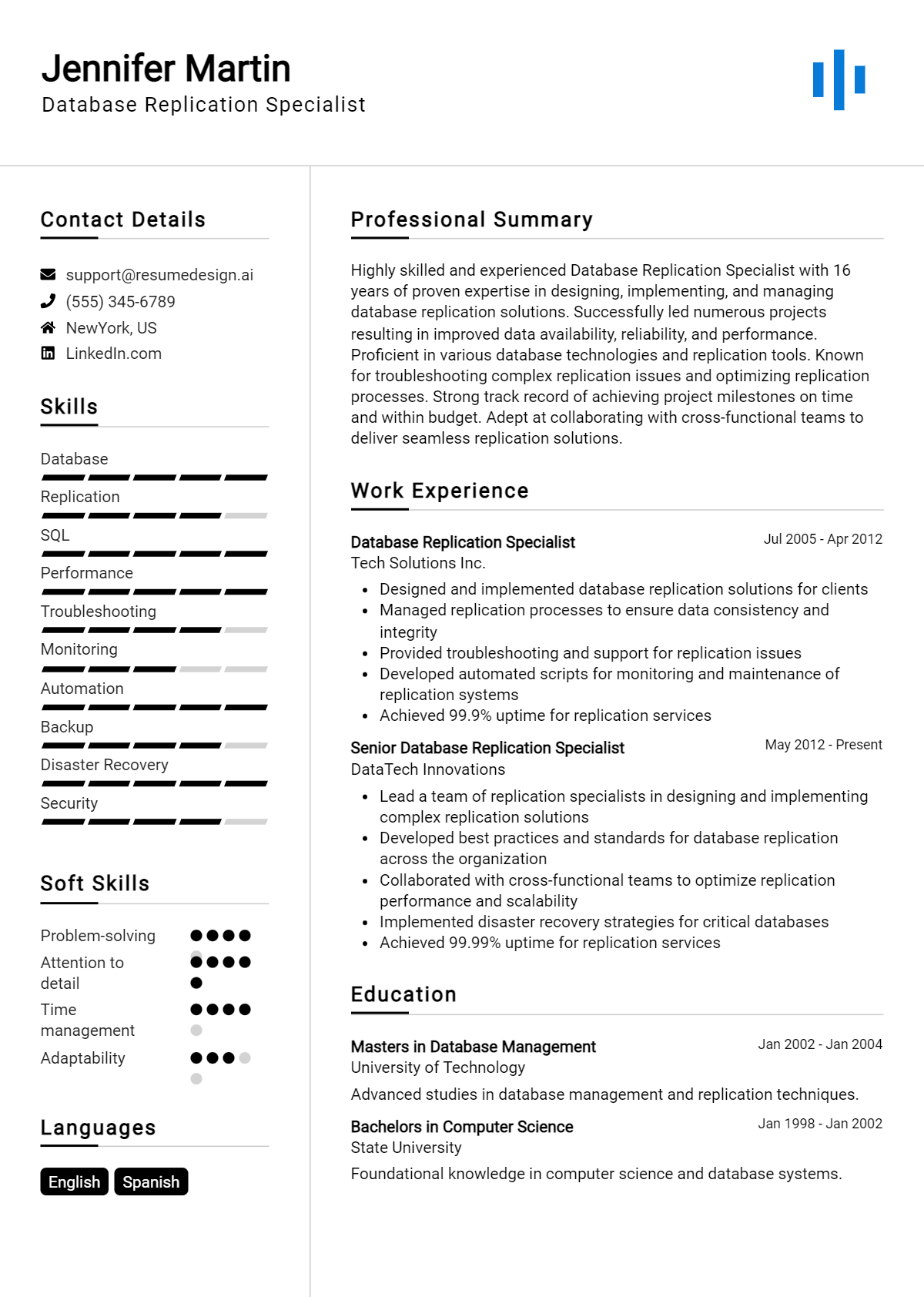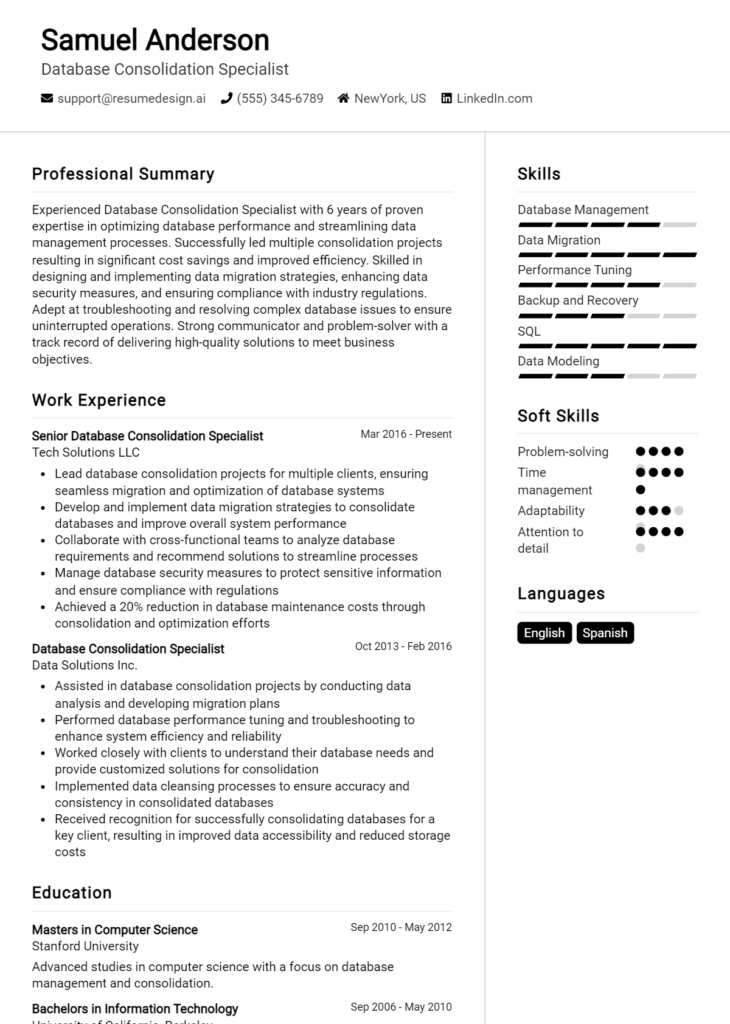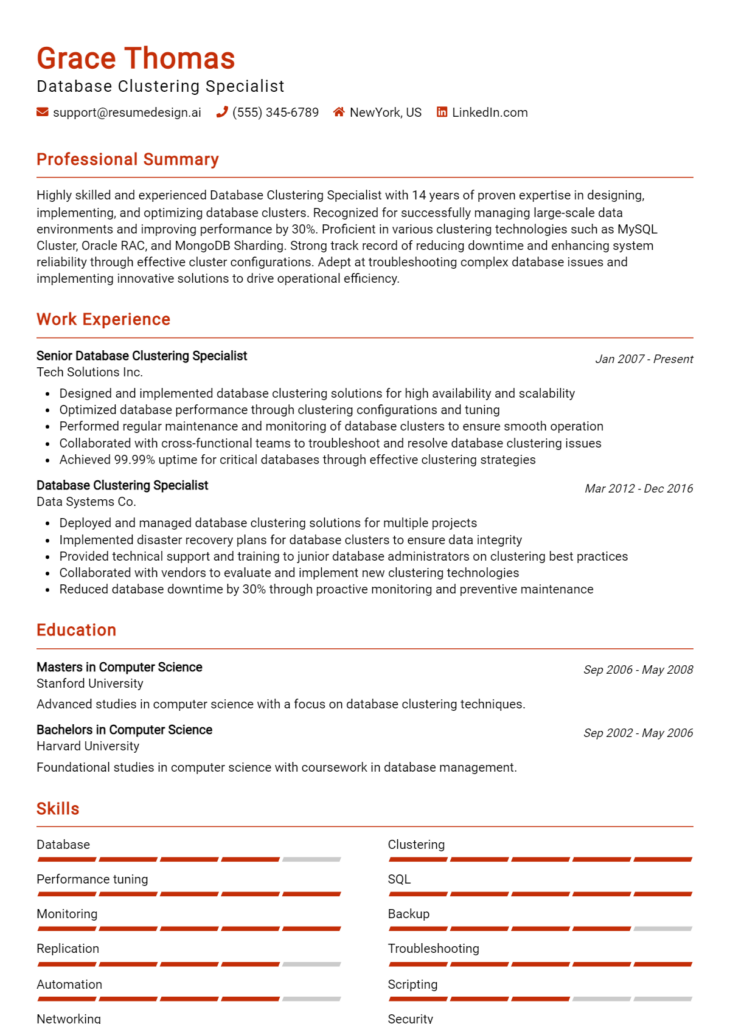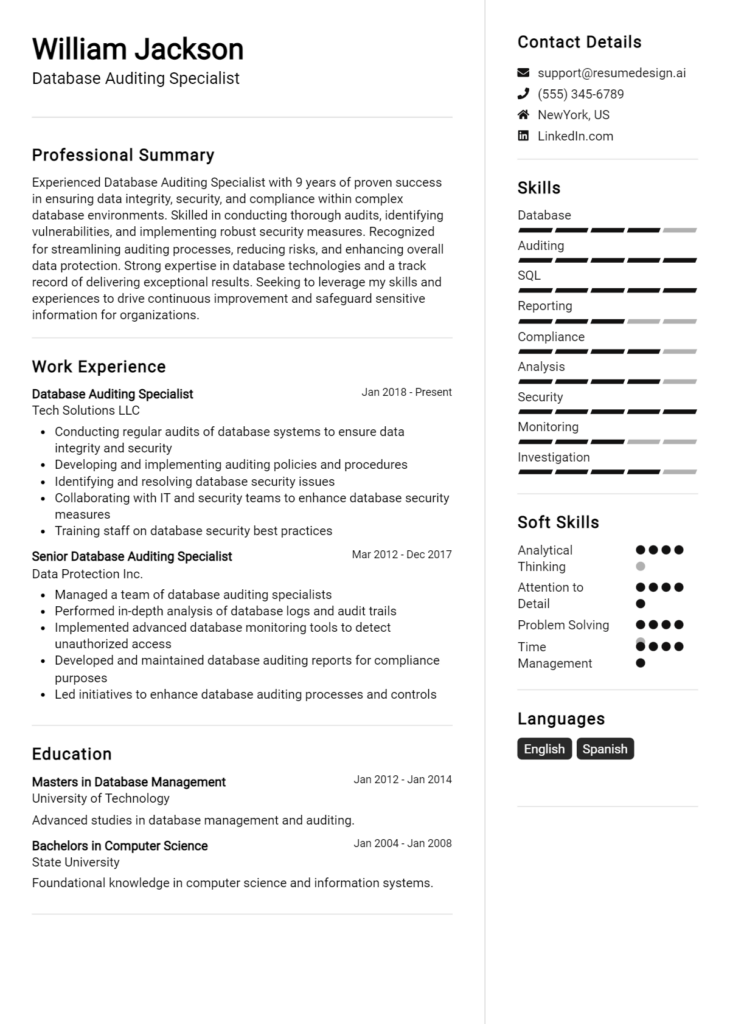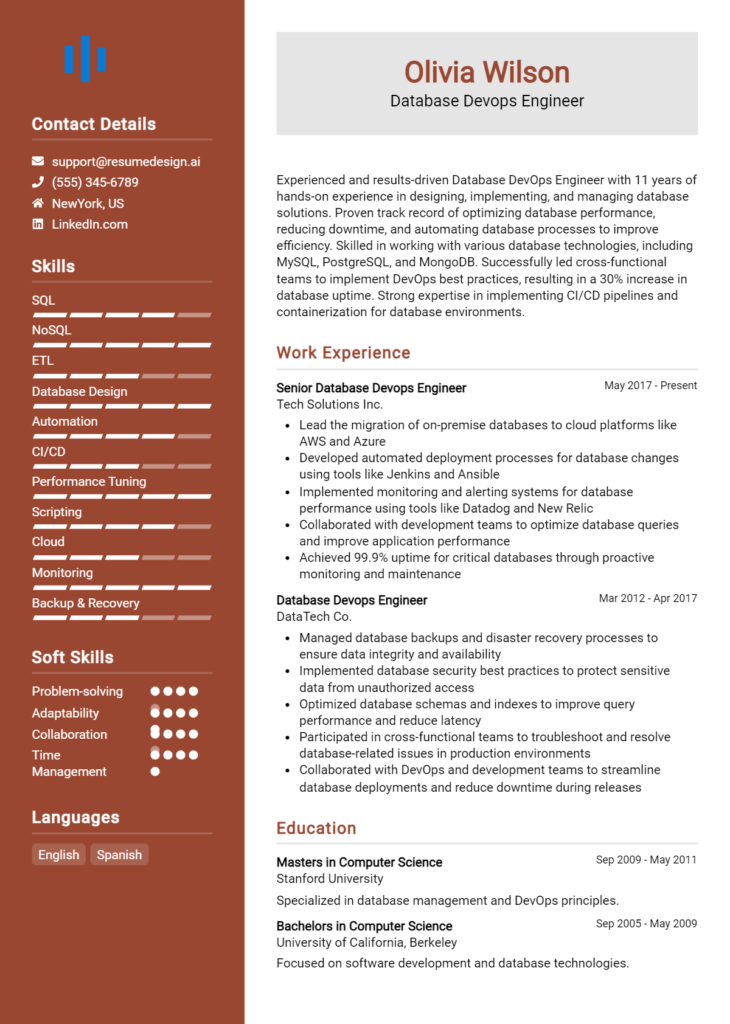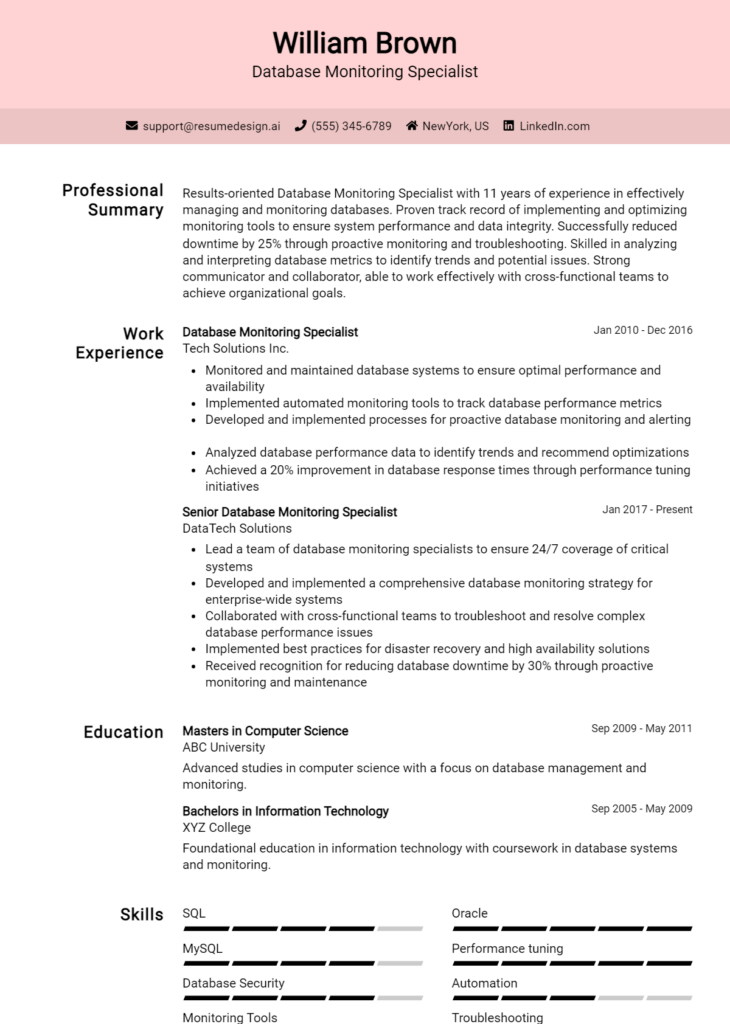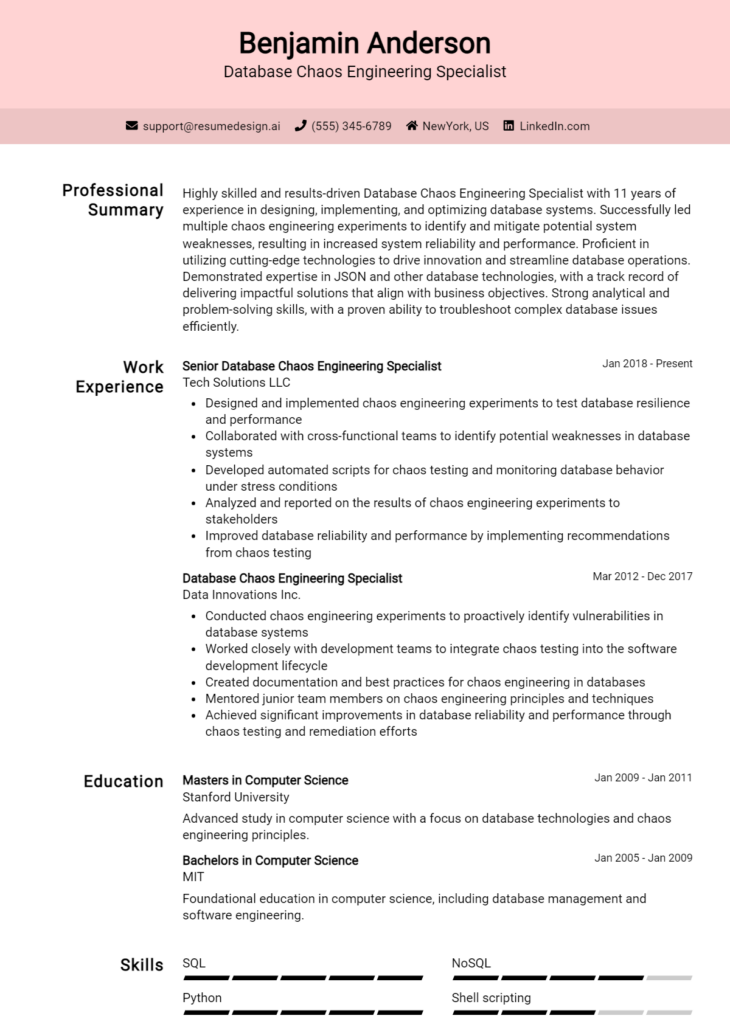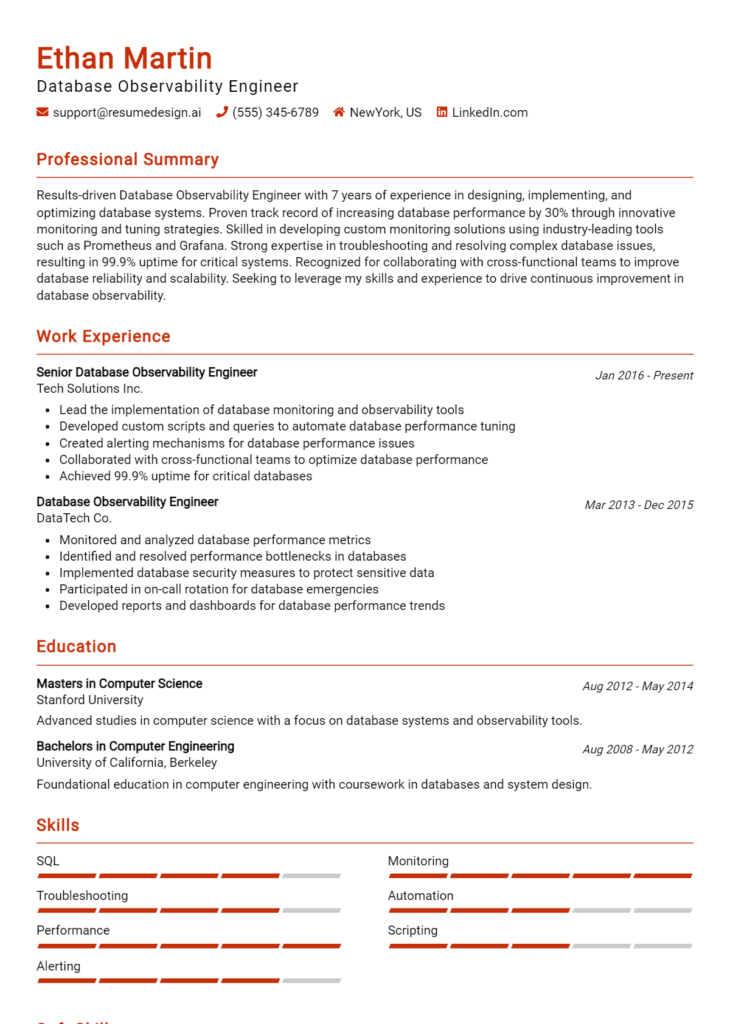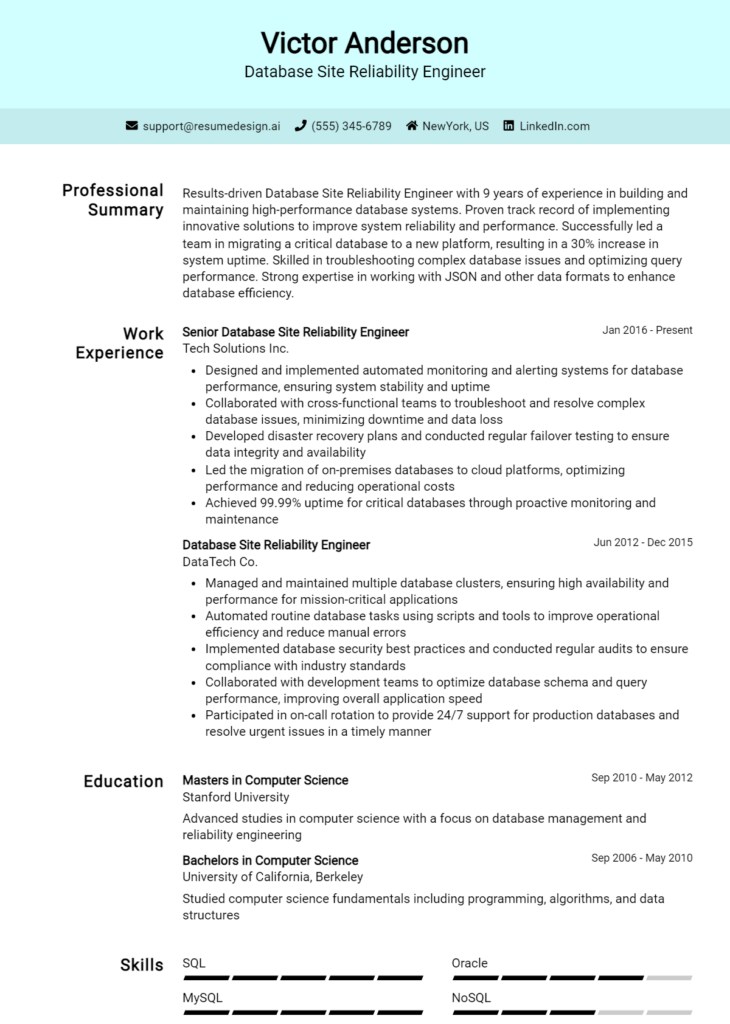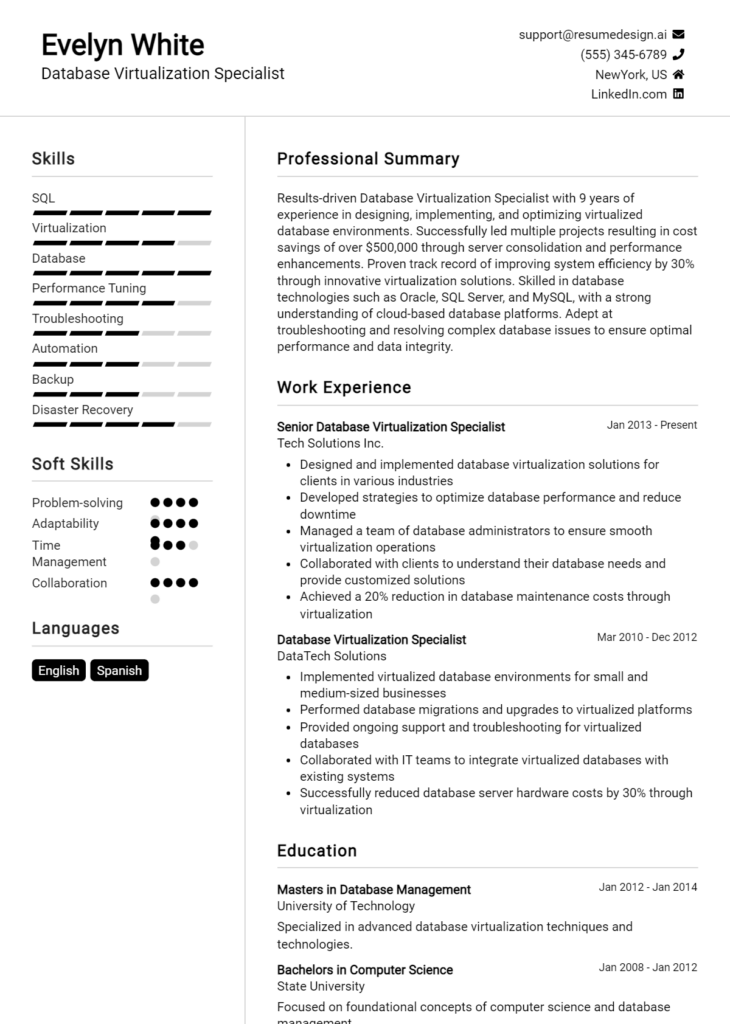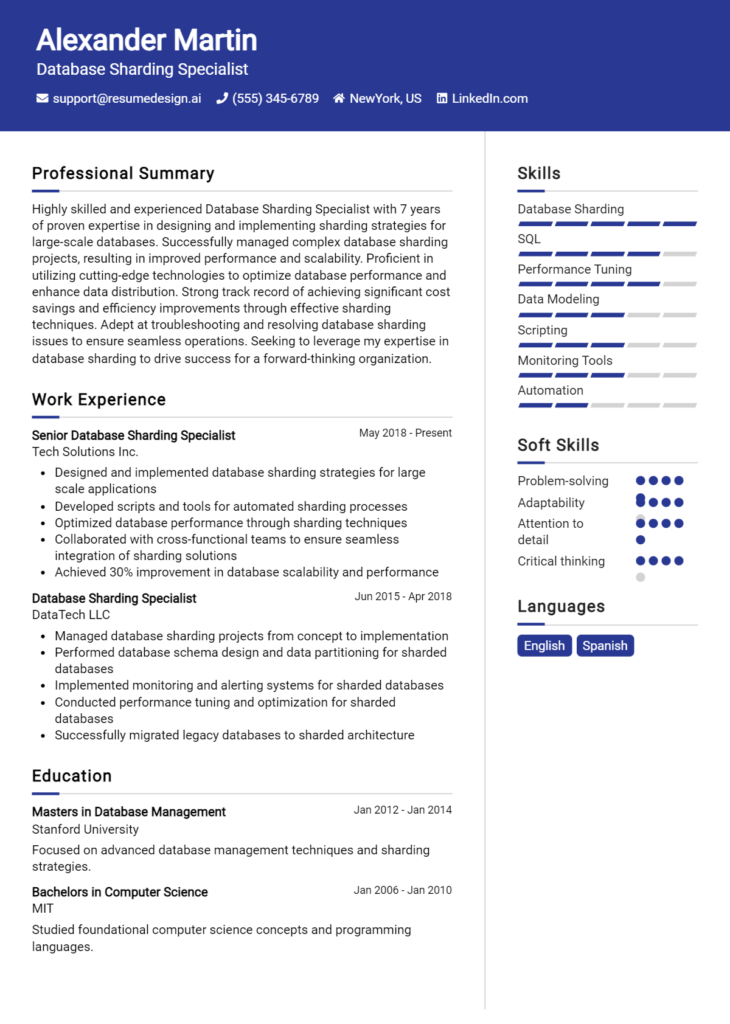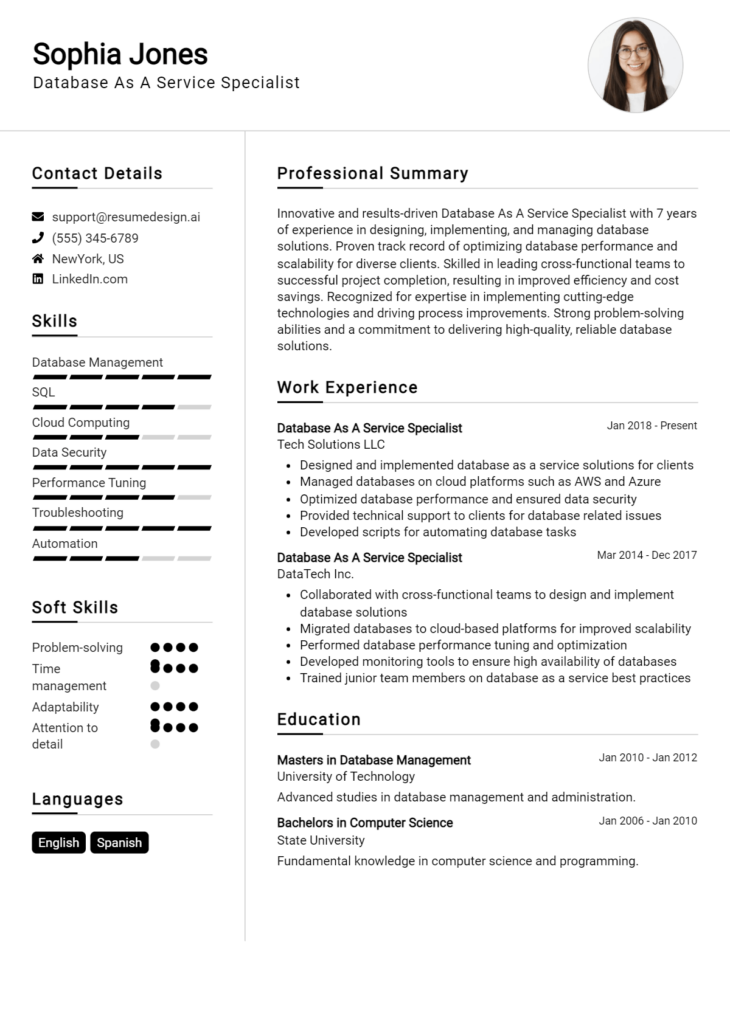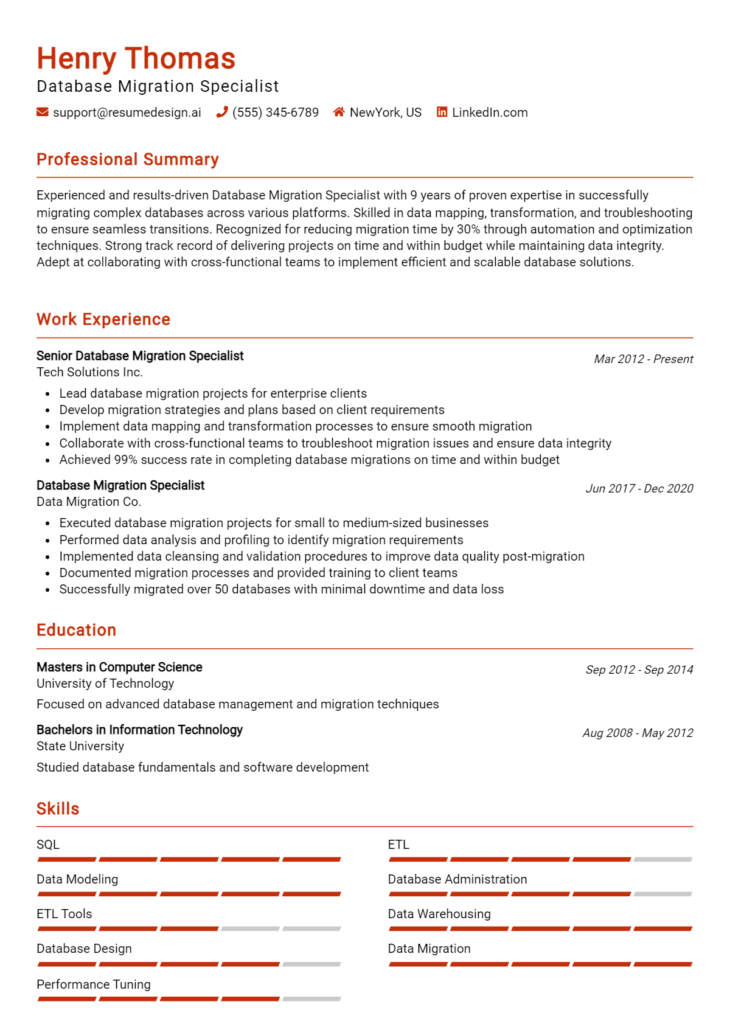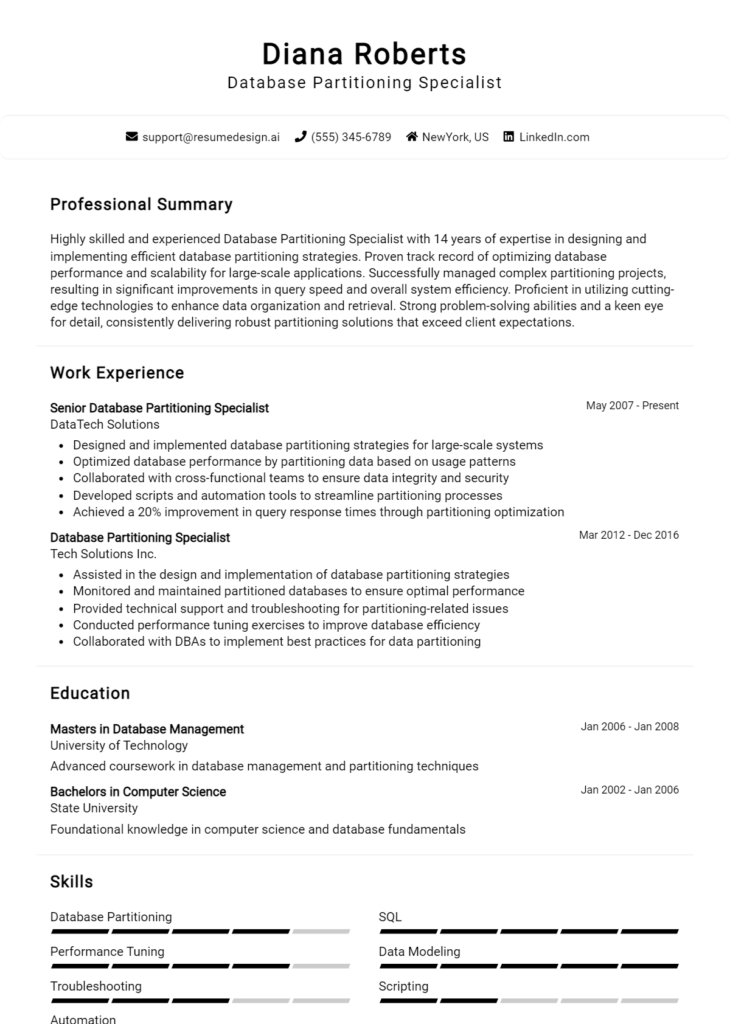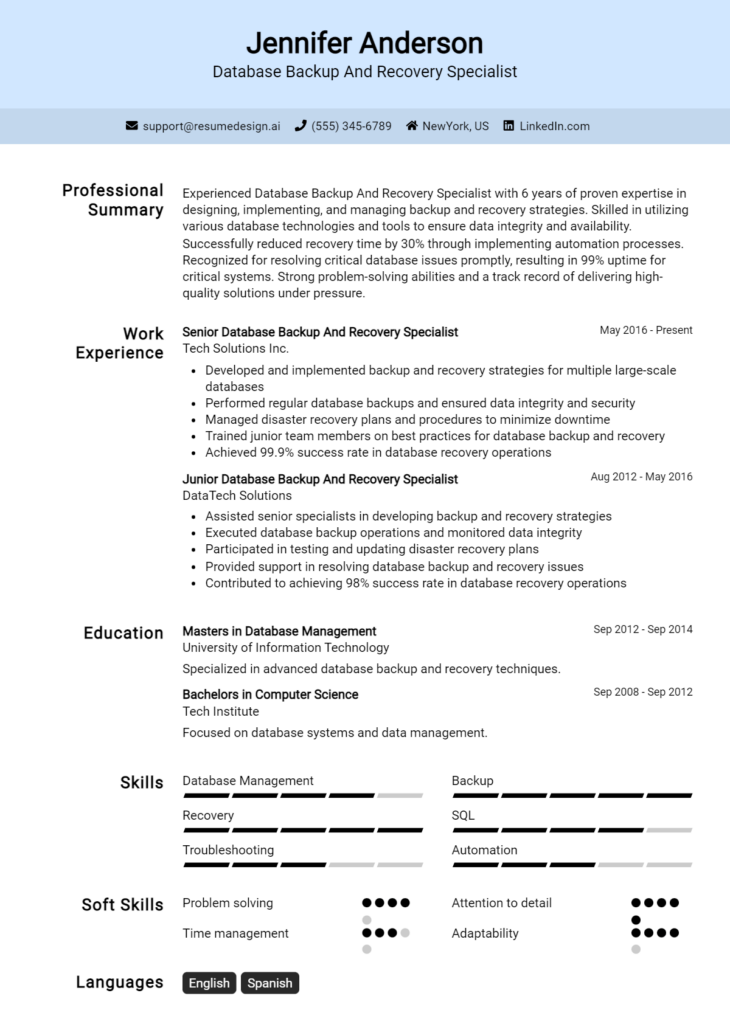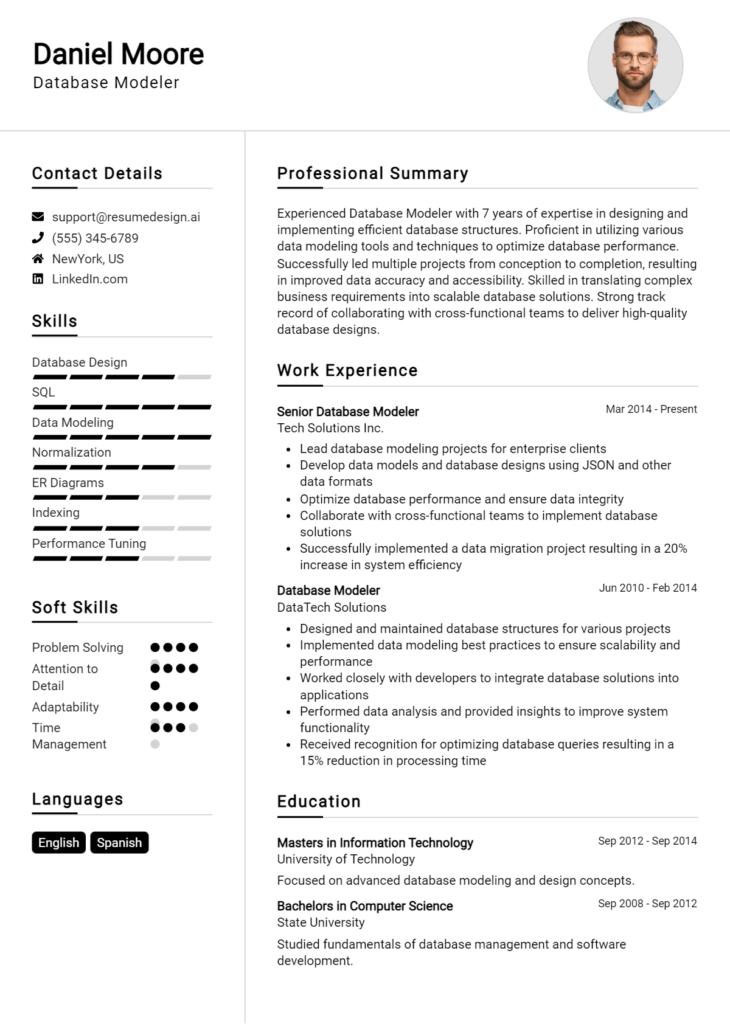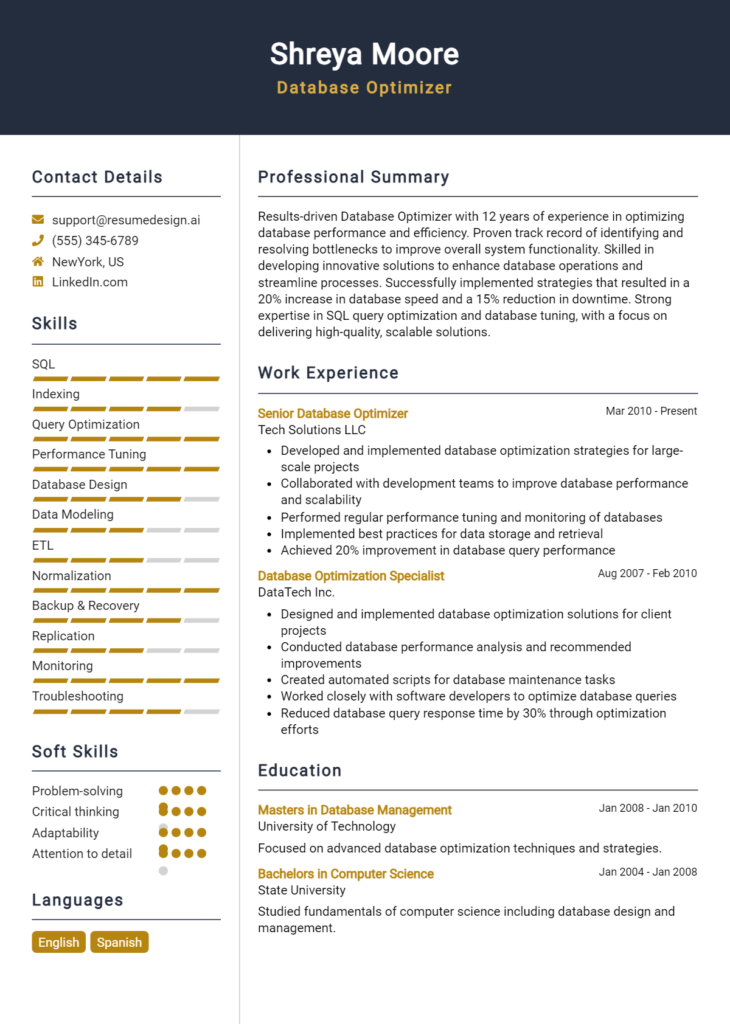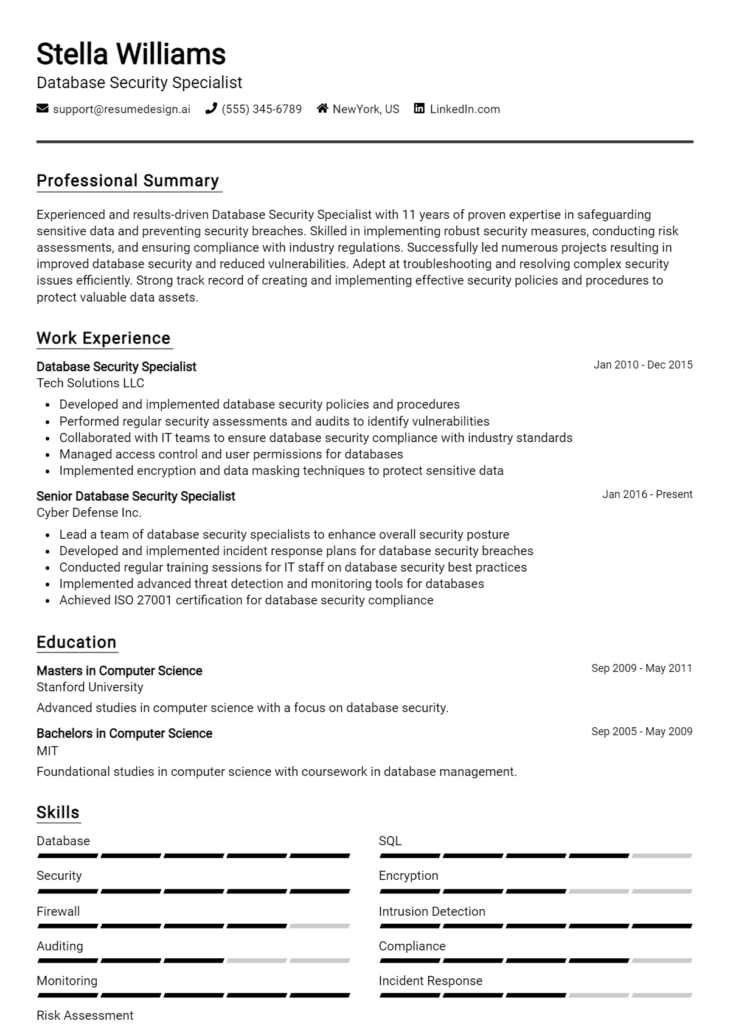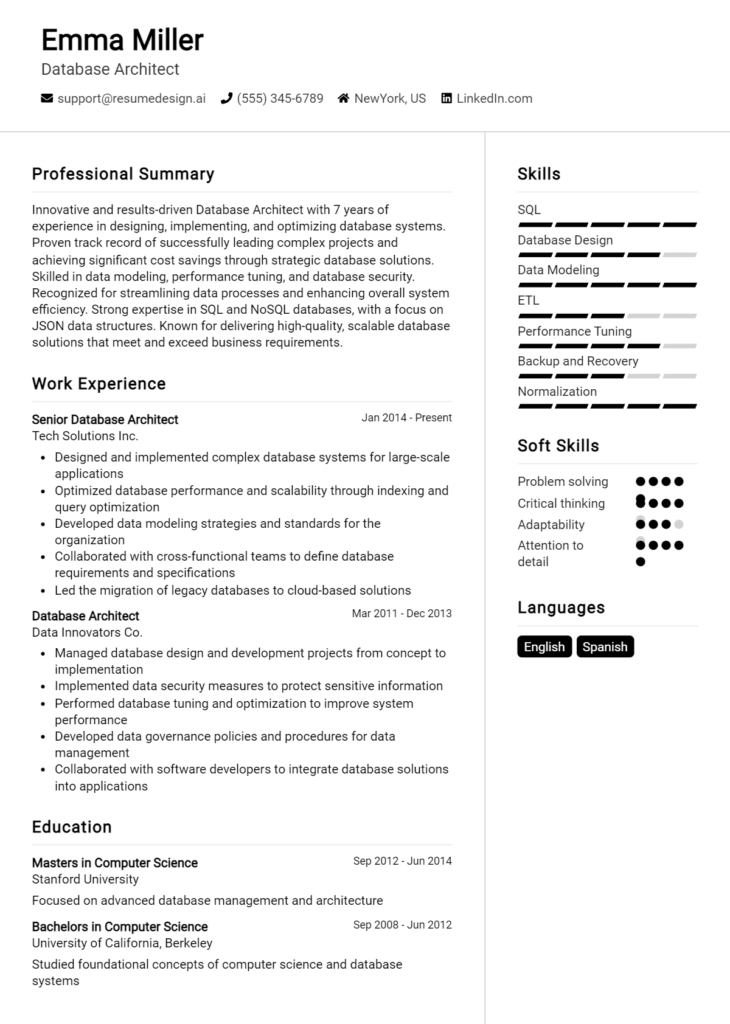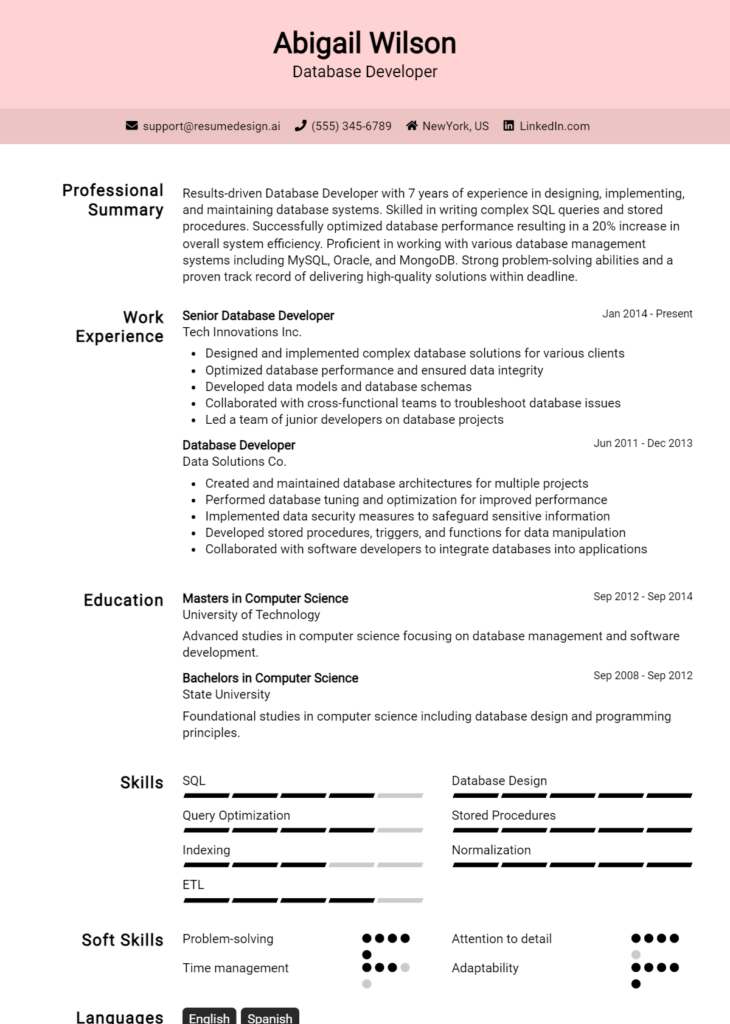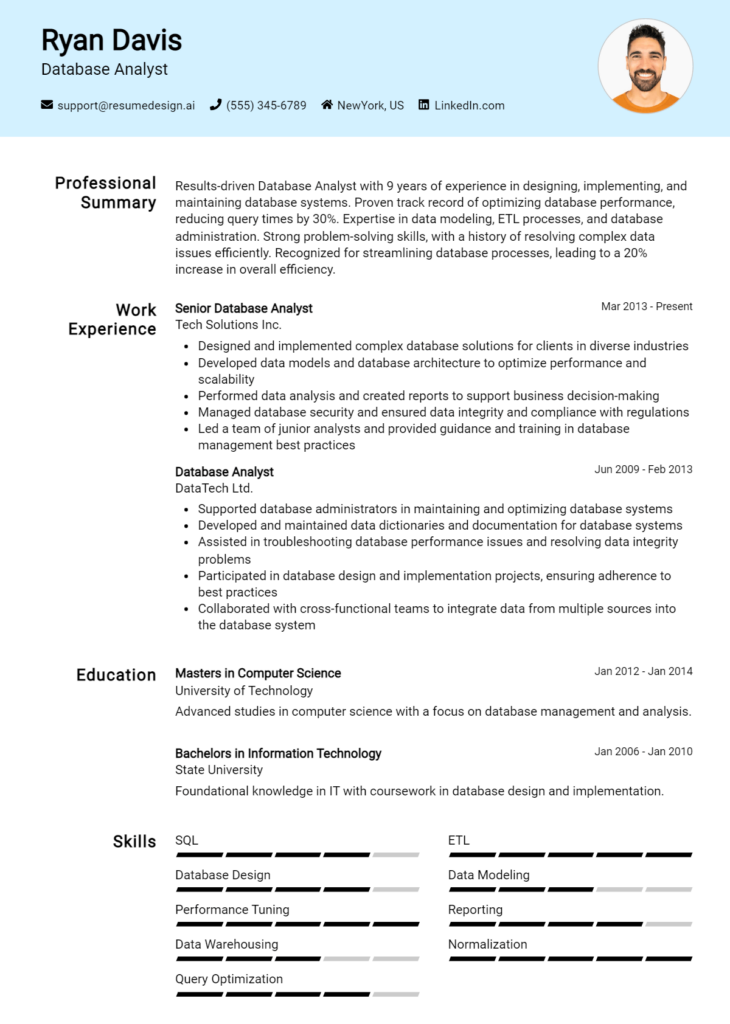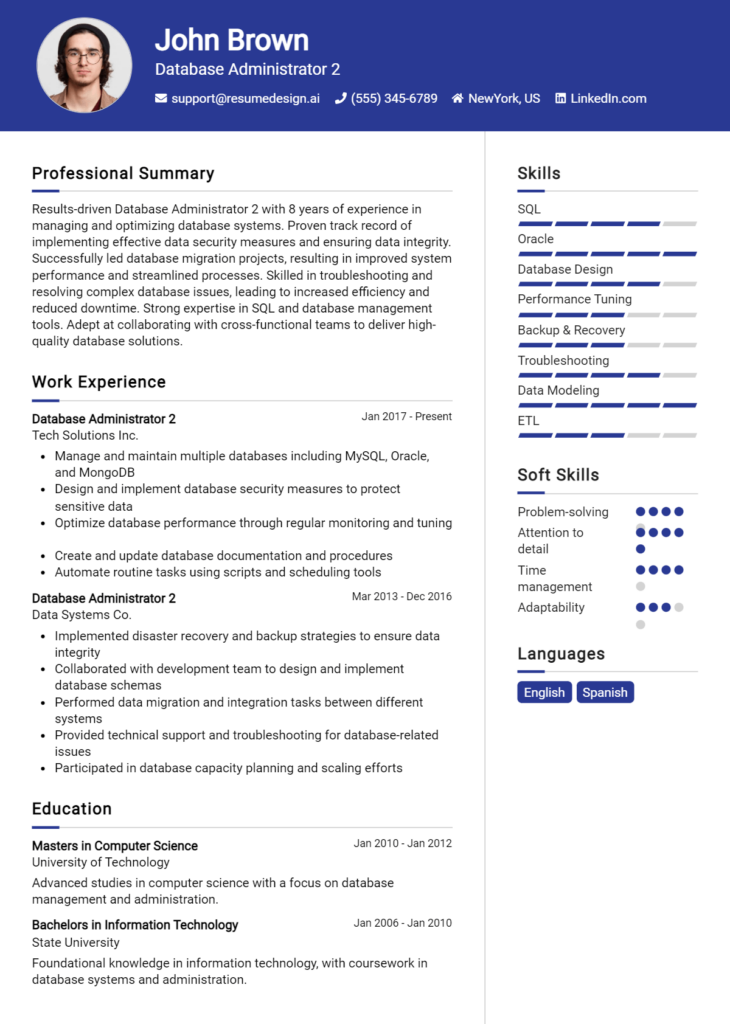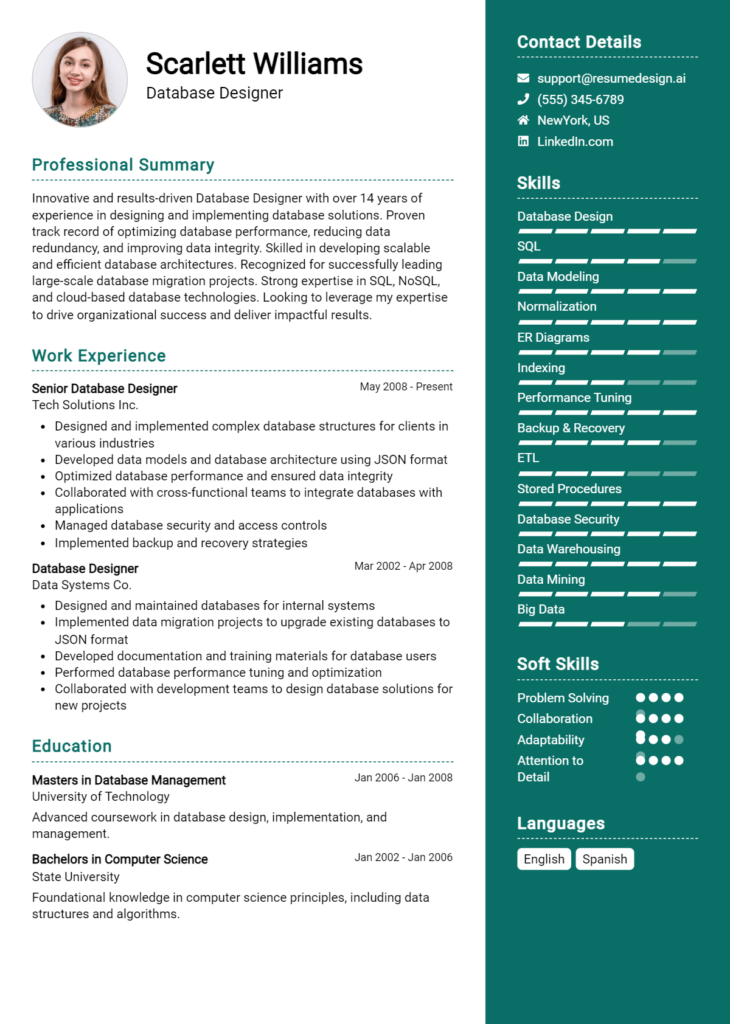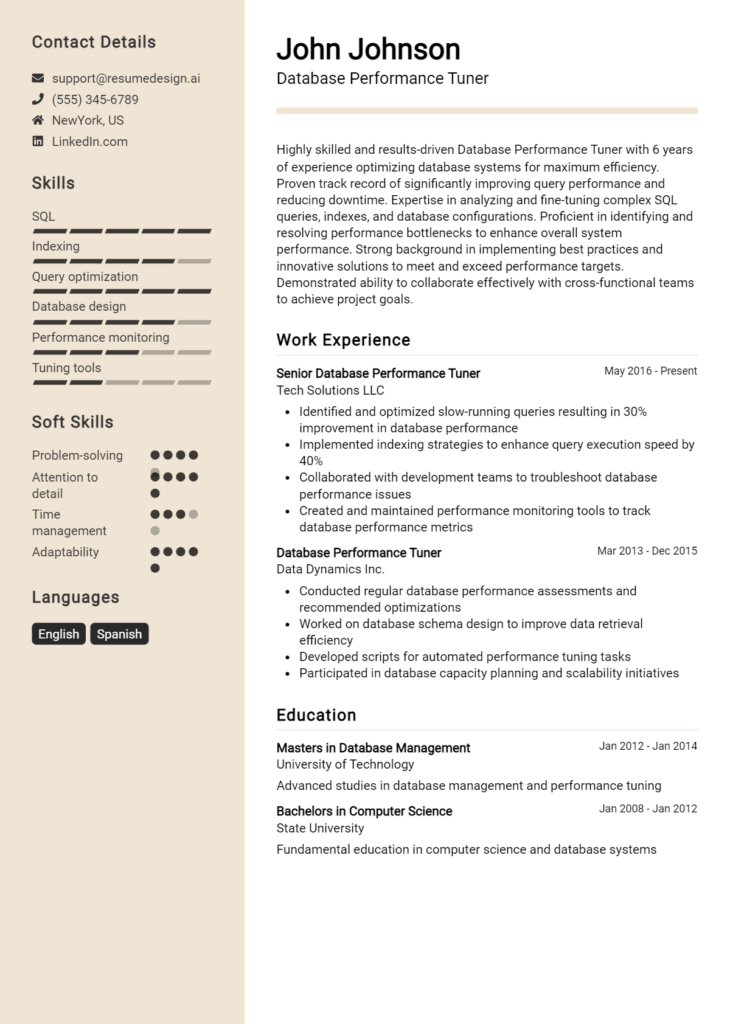Database Replication Specialist Core Responsibilities
A Database Replication Specialist is essential in ensuring data consistency and availability across different systems and departments. This role requires technical expertise in database technologies, operational understanding of data management, and strong problem-solving skills to troubleshoot replication issues. By collaborating with IT, development, and operations teams, the specialist helps align data processes with organizational goals. A well-structured resume highlighting these competencies can significantly enhance career opportunities in this critical field.
Common Responsibilities Listed on Database Replication Specialist Resume
- Design and implement database replication strategies.
- Monitor and optimize replication performance.
- Conduct regular backups and data recovery procedures.
- Troubleshoot and resolve replication issues promptly.
- Collaborate with cross-functional teams to ensure data integrity.
- Document replication processes and maintain system configurations.
- Stay updated on database technologies and replication tools.
- Train staff on best practices for data replication.
- Develop disaster recovery plans related to database replication.
- Analyze system logs to identify potential replication failures.
- Ensure compliance with data security policies and procedures.
High-Level Resume Tips for Database Replication Specialist Professionals
In today's competitive job market, a well-crafted resume is crucial for Database Replication Specialist professionals looking to stand out. Often the first impression a candidate makes on a potential employer, the resume serves as a powerful tool to encapsulate both skills and achievements. A compelling resume not only highlights technical expertise but also tells a story of professional growth and success. This guide aims to provide practical and actionable resume tips specifically tailored for Database Replication Specialist professionals, ensuring that your application captures the attention of hiring managers.
Top Resume Tips for Database Replication Specialist Professionals
- Tailor your resume to the specific job description, using relevant keywords to match the employer's requirements.
- Highlight your experience with various database replication technologies, such as SQL Server Replication, Oracle GoldenGate, and MySQL Replication.
- Quantify your achievements, demonstrating how your contributions improved database performance, reduced downtime, or enhanced data integrity.
- Showcase your understanding of disaster recovery plans and high availability solutions as they relate to database replication.
- Include certifications relevant to database management and replication, such as Microsoft Certified: Azure Database Administrator Associate or Oracle Certified Professional.
- Emphasize collaboration skills, illustrating your ability to work with cross-functional teams to implement and maintain replication strategies.
- List any experience with cloud database solutions, showing familiarity with platforms such as AWS, Azure, or Google Cloud.
- Incorporate a section on continuous learning, highlighting any relevant training or workshops you've attended to stay current in the field.
- Keep your resume concise, ideally one page, focusing on the most pertinent information that aligns with the job you are applying for.
By implementing these tips, Database Replication Specialist professionals can significantly enhance their resumes, increasing the likelihood of landing interviews and, ultimately, securing positions in this specialized field. A strong resume not only showcases your qualifications but also demonstrates your commitment to excellence in database management and replication.
Why Resume Headlines & Titles are Important for Database Replication Specialist
In the competitive field of database management, the role of a Database Replication Specialist is pivotal in ensuring data integrity and availability across systems. A well-crafted resume headline or title serves as the first impression for hiring managers, succinctly summarizing a candidate's key qualifications and expertise. A strong headline can immediately grab attention, conveying essential information at a glance. It should be concise, relevant, and directly related to the specific job being applied for, helping candidates stand out in a crowded job market.
Best Practices for Crafting Resume Headlines for Database Replication Specialist
- Keep it concise: Aim for a headline that is no more than 10-12 words.
- Be role-specific: Include terms and phrases that directly relate to database replication.
- Highlight key skills: Integrate industry-relevant skills that showcase your expertise.
- Use numbers or metrics: Quantify achievements when possible to add credibility.
- Avoid jargon: Use clear language that is easily understood by hiring managers.
- Reflect your experience level: Tailor the headline to indicate your level of expertise, whether entry-level or senior.
- Include relevant certifications: Mention any certifications that are pertinent to the role.
- Make it impactful: Use action-oriented language to convey confidence and capability.
Example Resume Headlines for Database Replication Specialist
Strong Resume Headlines
"Experienced Database Replication Specialist with 5+ Years in High-Availability Systems"
“Certified Data Management Professional Specializing in Cross-Platform Replication Solutions”
“Results-Driven Database Specialist: Streamlined Replication Processes Increasing Efficiency by 30%”
“Expert in Data Integrity and Replication with Proven Track Record in Disaster Recovery”
Weak Resume Headlines
“Database Specialist”
“Looking for a Job in IT”
The strong headlines are effective because they clearly articulate the candidate's skills, experience, and specific contributions to the field of database replication, making them memorable and relevant. In contrast, the weak headlines fail to convey any unique qualifications or insights, appearing generic and uninspired, which can lead to being overlooked by hiring managers.
Writing an Exceptional Database Replication Specialist Resume Summary
A resume summary is a critical component for a Database Replication Specialist as it serves as the first impression for hiring managers. In a competitive job market, a strong summary swiftly captures attention by highlighting key skills, relevant experience, and notable accomplishments that align with the specific job role. It should be concise yet impactful, providing a snapshot of the candidate's qualifications and demonstrating their suitability for the position. Tailoring the summary to the job description ensures that the candidate stands out, making it easier for hiring managers to see the potential fit within their organization.
Best Practices for Writing a Database Replication Specialist Resume Summary
- Quantify Achievements: Use specific numbers to illustrate your impact, such as the percentage of downtime reduced or the number of successful replication setups completed.
- Focus on Skills: Highlight key technical skills relevant to database replication, such as experience with specific tools, languages, or technologies.
- Tailor to the Job Description: Customize your summary for each application by incorporating keywords and phrases from the job listing.
- Be Concise: Aim for 3-5 sentences that clearly communicate your value without unnecessary detail.
- Include Relevant Certifications: Mention any industry-recognized certifications that enhance your credibility as a replication specialist.
- Showcase Problem-Solving Abilities: Highlight your capacity to address challenges in database replication, such as data integrity issues or synchronization failures.
- Emphasize Team Collaboration: Mention experience working with cross-functional teams to implement replication strategies effectively.
- Use Action Verbs: Start sentences with strong action verbs like "implemented," "optimized," or "managed" to convey your proactive contributions.
Example Database Replication Specialist Resume Summaries
Strong Resume Summaries
Results-oriented Database Replication Specialist with over 8 years of experience in implementing high-availability solutions for enterprise-level databases. Successfully reduced replication lag by 40% through optimized configurations and monitoring, ensuring seamless data access across multiple locations.
Detail-oriented Database Replication Specialist adept at managing complex replication environments. Implemented a multi-site replication strategy that improved data recovery time by 50%, enhancing overall system reliability and availability for critical business applications.
Proficient Database Replication Specialist with expertise in Oracle and SQL Server replication technologies. Played a key role in a project that scaled replication processes to support 10,000+ concurrent users, resulting in a 30% increase in transaction throughput.
Weak Resume Summaries
Database professional with experience in replication and database management. Looking for a new opportunity.
Skilled in various database technologies. I have worked on different projects and am eager to contribute to a new team.
The examples of strong resume summaries effectively highlight specific achievements, relevant skills, and quantifiable outcomes that demonstrate the candidate's expertise as a Database Replication Specialist. In contrast, the weak summaries lack detail, specificity, and measurable results, making them less compelling for hiring managers. A strong summary provides clarity and context, setting the stage for a more in-depth evaluation of the candidate's qualifications.
Work Experience Section for Database Replication Specialist Resume
The work experience section of a Database Replication Specialist resume is critical as it serves as a showcase for a candidate's technical expertise, ability to manage teams, and commitment to delivering high-quality products. This section not only highlights specific skills related to database replication technologies but also demonstrates how past experiences align with industry standards. By quantifying achievements and detailing relevant responsibilities, candidates can effectively convey their impact in previous roles, making it essential to present this information clearly and compellingly.
Best Practices for Database Replication Specialist Work Experience
- Highlight specific database technologies and replication methods used.
- Quantify achievements, such as percentage improvements in data consistency or system uptime.
- Showcase leadership in managing cross-functional teams for successful project delivery.
- Detail collaborations with other IT departments to enhance overall system performance.
- Use action verbs to describe your contributions and responsibilities.
- Tailor the experience to align with the job description and industry standards.
- Include relevant certifications or training that support your expertise.
- Provide context for each role to illustrate the scope and significance of your work.
Example Work Experiences for Database Replication Specialist
Strong Experiences
- Successfully implemented a multi-site database replication strategy, increasing data availability by 40% and reducing failover time by 30%.
- Led a team of 5 engineers in the migration of legacy systems to a cloud-based replication architecture, resulting in a 50% decrease in operational costs.
- Developed and executed a comprehensive database monitoring solution that improved incident response times by 25% and enhanced system reliability.
- Collaborated with application development teams to optimize database queries, achieving a 15% increase in application performance, directly impacting user satisfaction ratings.
Weak Experiences
- Worked on database projects.
- Responsible for replication tasks.
- Assisted team members with database issues.
- Participated in meetings regarding database performance.
The examples of strong experiences are considered effective because they provide specific outcomes, highlight technical leadership, and showcase collaboration, all of which are essential for a Database Replication Specialist. They include quantifiable results that demonstrate the candidate's impact on the organization. In contrast, the weak experiences lack detail and measurable achievements, making them less compelling and failing to illustrate the candidate's true capabilities in the field.
Education and Certifications Section for Database Replication Specialist Resume
The education and certifications section of a Database Replication Specialist resume plays a critical role in showcasing a candidate's academic background and their commitment to professional development. It highlights the candidate's qualifications, including relevant degrees and industry-recognized certifications, which are essential for demonstrating expertise in database technologies and replication processes. By including pertinent coursework and specialized training, this section enhances the credibility of the applicant, aligning their skills and knowledge with the specific demands of the role. A well-crafted education and certifications section not only reflects the candidate's foundational knowledge but also underscores their dedication to continuous learning in a rapidly evolving field.
Best Practices for Database Replication Specialist Education and Certifications
- List relevant degrees that pertain to database management, computer science, or information technology.
- Include industry-recognized certifications such as Microsoft Certified: Azure Database Administrator Associate or Oracle Certified Professional, MySQL Database Administrator.
- Provide details of specialized training programs in database replication technologies and tools.
- Highlight any coursework that covers topics like data synchronization, distributed databases, and backup strategies.
- Keep the information concise and focused on qualifications that directly relate to database replication roles.
- Use clear formatting to differentiate between degrees, certifications, and training for easy readability.
- Update the section regularly to include any new qualifications or certifications obtained.
- Consider including professional development courses or workshops that demonstrate a commitment to staying current in the field.
Example Education and Certifications for Database Replication Specialist
Strong Examples
- Bachelor of Science in Computer Science, XYZ University
- Oracle Certified Professional, MySQL Database Administrator
- Microsoft Certified: Azure Database Administrator Associate
- Coursework in Distributed Database Systems and Data Replication Techniques
Weak Examples
- Associate Degree in General Studies
- Certification in Microsoft Office Suite
- High School Diploma
- Outdated certification in SQL Server 2008
The examples provided illustrate the importance of relevance in educational qualifications and certifications. The strong examples represent degrees and certifications that are directly applicable to a Database Replication Specialist's role, showcasing advanced knowledge and current industry standards. In contrast, the weak examples highlight irrelevant educational backgrounds and outdated certifications that do not align with the requirements of the position, which could detract from a candidate’s suitability for the job.
Top Skills & Keywords for Database Replication Specialist Resume
As a Database Replication Specialist, possessing the right skills is crucial for ensuring data consistency, availability, and reliability across various systems. A well-crafted resume that highlights both hard and soft skills can significantly enhance a candidate's chances of landing an interview. Employers seek specialists who not only have technical expertise but also the ability to communicate effectively and collaborate with cross-functional teams. By showcasing these essential skills, candidates can demonstrate their readiness to tackle the complexities of database replication and management, ultimately contributing to a more robust data infrastructure.
Top Hard & Soft Skills for Database Replication Specialist
Soft Skills
- Effective Communication
- Problem-Solving
- Team Collaboration
- Attention to Detail
- Time Management
- Adaptability
- Critical Thinking
- Analytical Skills
- Conflict Resolution
- Customer Service Orientation
Hard Skills
- Database Management Systems (DBMS) expertise (e.g., MySQL, Oracle, SQL Server)
- Knowledge of Replication Technologies (e.g., log shipping, mirroring)
- Proficiency in SQL and PL/SQL
- Experience with Data Migration Tools
- Understanding of Backup and Recovery Strategies
- Familiarity with Cloud Database Solutions (e.g., AWS RDS, Azure SQL)
- Performance Tuning and Optimization
- Scripting Languages (e.g., Python, Bash)
- Data Modeling and Design
- Security Best Practices in Database Management
For more details on how to effectively present your skills and work experience, consider tailoring your resume to showcase these key attributes that resonate with potential employers.
Stand Out with a Winning Database Replication Specialist Cover Letter
I am writing to express my interest in the Database Replication Specialist position at [Company Name], as advertised on [where you found the job listing]. With a solid background in database management and a deep understanding of replication technologies, I am confident in my ability to enhance your data integrity and availability. My expertise in designing, implementing, and maintaining effective replication strategies has equipped me with the skills necessary to contribute positively to your team.
In my previous role at [Previous Company Name], I was responsible for overseeing the replication of databases across multiple environments, ensuring that data was consistently synchronized and accessible. I successfully implemented a robust replication architecture that reduced downtime by 30% and improved system performance. My experience with various replication tools, such as Oracle GoldenGate, Microsoft SQL Server Replication, and MySQL Replication, allows me to adapt to your organization’s specific needs quickly. Additionally, I have a proven track record of troubleshooting complex issues related to data replication and integrity, which further solidifies my qualification for this role.
Collaboration is key in my approach to database management. I have worked closely with cross-functional teams to understand their data requirements and have tailored replication solutions that meet their needs while adhering to best practices. My strong analytical skills enable me to monitor replication processes effectively and make data-driven decisions to enhance performance. I am excited about the opportunity to bring my expertise to [Company Name] and help optimize your database systems for greater efficiency and reliability.
Thank you for considering my application. I am eager to discuss how my skills and experience align with the needs of your team and contribute to the ongoing success of [Company Name]. I look forward to the possibility of an interview to further explore this exciting opportunity.
Common Mistakes to Avoid in a Database Replication Specialist Resume
When crafting a resume for the position of a Database Replication Specialist, it's vital to avoid common pitfalls that can undermine your application. A well-structured resume not only highlights your technical skills but also reflects your understanding of the role and the industry. Below are some of the frequent mistakes candidates make when applying for this position, along with explanations to help you steer clear of them.
Lack of Specificity: Using vague terms instead of specific technologies or methodologies can make your experience seem less impactful. Clearly state the databases you've worked with, such as MySQL, Oracle, or PostgreSQL, and the replication methods employed.
Ignoring Keywords: Failing to incorporate relevant keywords from the job description can result in your resume being overlooked by applicant tracking systems (ATS). Tailor your resume for each application by including specific terms related to database replication, such as “asynchronous replication” or “data synchronization.”
Overloading with Technical Jargon: While it's important to showcase your expertise, using excessive technical jargon can alienate non-technical hiring managers. Balance technical language with clear explanations to ensure your skills are understood by all stakeholders.
Neglecting Soft Skills: Focusing solely on technical skills without mentioning soft skills can give an incomplete picture of your capabilities. Highlight skills such as problem-solving, teamwork, and communication, which are essential in collaborative environments.
Inconsistent Formatting: A resume with inconsistent formatting can be difficult to read and may convey a lack of attention to detail. Ensure uniformity in font sizes, bullet points, and spacing throughout the document to enhance readability.
Listing Duties Instead of Achievements: Simply listing job duties can make your resume seem generic. Instead, emphasize your achievements and contributions, quantifying them where possible (e.g., “Improved data replication speed by 30%”).
Omitting Relevant Certifications: Not including relevant certifications or training can diminish your appeal to employers. Certifications such as Oracle Certified Professional or Microsoft Certified: Azure Database Administrator Associate can set you apart.
Failing to Tailor for Each Role: Sending out the same resume for multiple positions can be detrimental. Tailor your resume for each job application, emphasizing the experiences and skills that are most relevant to the specific role you're applying for.
Conclusion
As a Database Replication Specialist, you play a crucial role in ensuring data consistency and availability across various systems. Your expertise in database technologies, replication strategies, and troubleshooting can significantly impact an organization’s performance. Here are some key points to remember:
Understanding Database Replication: Familiarize yourself with different replication methods such as synchronous, asynchronous, and multi-master replication, and know when to use each.
Tools and Technologies: Proficiency in tools like SQL Server Replication, Oracle GoldenGate, or MySQL Replication is essential for executing efficient replication strategies.
Monitoring and Maintenance: Regularly monitor replication processes to identify and resolve any issues promptly, ensuring minimal downtime and data loss.
Best Practices: Stay updated with best practices in database management and replication to enhance performance and security.
Documentation and Collaboration: Maintain thorough documentation of replication setups and collaborate with other IT professionals to optimize data management.
In light of these considerations, it’s crucial to ensure your resume reflects your skills and experience effectively. Take the time to review your Database Replication Specialist resume and ensure it highlights your expertise in this specialized field.
Enhance your resume with the help of various tools available online. Explore resume templates to find a design that suits your style, utilize the resume builder for a streamlined creation process, check out resume examples for inspiration, and don’t forget to craft a compelling cover letter using cover letter templates. Taking these steps can significantly improve your chances of landing the ideal position in this competitive field.

